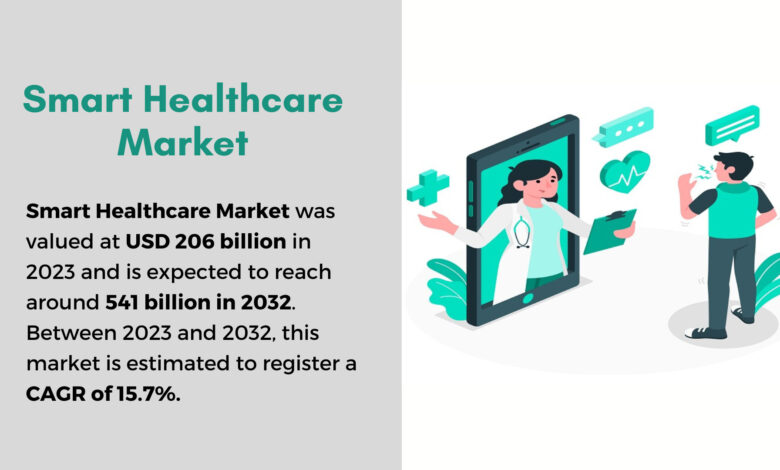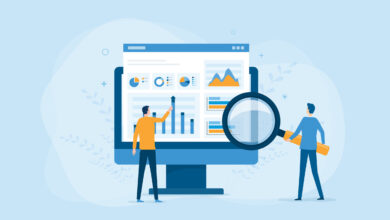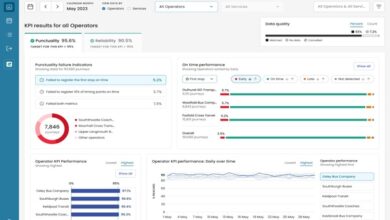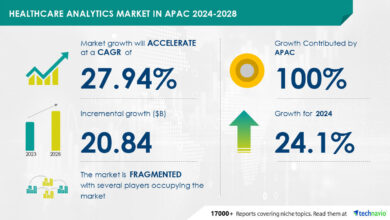Smart Healthcare Market Next Generation of Health Solutions

Introduction
In 2023, the Smart Healthcare Market was valued at an impressive USD 206 Billion and is forecasted to surge to approximately USD 541 Billion by 2032. This sector is anticipated to witness a robust compound annual growth rate (CAGR) of 15.7% between 2023 and 2032.
Smart Healthcare is a patient-centric healthcare system that utilizes Smart Healthcare System (SHS) devices for remote patient monitoring. It incorporates networks of sensors, actuators, and personal medical devices (PMDs), which facilitate the integration of modern technology with electronic health records. These medical tracking systems continuously monitor a patient’s health status and transmit the data to healthcare professionals or authorized providers, ensuring timely and informed medical care. Smart healthcare represents a transformative approach to healthcare delivery, integrating advanced technologies to improve the efficiency, accuracy, and accessibility of healthcare services.
Smart healthcare includes various innovative components such as Electronic Health Records (EHRs), which digitize patient data for more efficient access and management. Telemedicine platforms extend services to remote areas, offering consultations and medical services via digital communication tools. Mobile health (mHealth) applications and wearable devices also provide continuous patient monitoring, enhancing preventive care and chronic condition management. Smart pills, another pivotal element, employ ingestible sensors to monitor medication adherence and internal health metrics, providing critical data for personalized medicine.
To learn more about this report – Request A Sample Report PDF
This sector’s growth is driven by the increasing demand for more efficient healthcare solutions, the aging global population, and rising healthcare costs. Moreover, advancements in IoT, AI, and big data analytics further propel the development of smart healthcare solutions, making them more accessible and effective. The integration of these technologies not only streamlines workflow in healthcare settings but also empowers patients by giving them more control over their health outcomes. As the market expands, these innovations are set to revolutionize the healthcare landscape, making services more patient-centric and data-driven.
Key Takeaways
- Market Size: Smart Healthcare Market was valued at USD 206 billion in 2023 and is expected to reach around USD 541 billion in 2032
- Market Growth: The global smart healthcare market is anticipated to grow at a CAGR of 15.7%.
- Key Drivers: Advancements in technology, including IoT, AI, and Big Data Analytics, are enabling more efficient and effective healthcare solutions. Growing demand for personalized healthcare and the need to reduce healthcare costs are driving the adoption of smart healthcare.
- Product Type Analysis: mHealth dominates the market with a 34% market share, driven by mHealth apps and wearable devices.
- Application Analysis: Storage and inventory management hold a 29% market share, improving hospital operations. Smart healthcare technologies enable remote patient monitoring, personalized medicine, and drug delivery.
- End-User Analysis: Hospitals are the dominant end-users with a 38% market share, benefiting from tools like telemedicine and remote monitoring. Wearable devices and mobile apps empower patients to take a more active role in their healthcare.
Smart Healthcare Statistics
Adoption and Implementation of Smart Healthcare Solutions:
- The smart healthcare market was valued at USD 184 billion in 2022 and is forecasted to reach approximately USD 541 billion by 2032, with a projected CAGR of 15.7% between 2023 and 2032.
- AI-based diagnostics have demonstrated an impressive accuracy rate of 90% in detecting certain medical conditions.
- Telemedicine usage has surged globally, witnessing an 80% increase in the past year, with telehealth services reducing hospital readmission rates by 30% in certain patient populations.
Internet of Things (IoT) in Healthcare:
- IoT adoption in healthcare is expected to reach 87% by 2025, with over 60% of healthcare organizations already utilizing IoT devices for monitoring and data collection.
- IoT-enabled remote patient monitoring has resulted in a 45% reduction in hospital readmissions, showcasing its effectiveness in improving patient outcomes.
Artificial Intelligence (AI) in Healthcare:
- The global market for AI in healthcare was valued at USD 9.81 billion in 2022 and is projected to reach USD 238.5 billion by 2032, with AI-powered diagnostic tools achieving an accuracy rate of around 95%.
- AI-driven drug discovery processes have increased efficiency by up to 70%, while personalized treatment plans enabled by AI-powered data analysis have led to a 60% improvement in treatment outcomes.
Big Data and Analytics in Healthcare:
- Over 80% of healthcare organizations believe that big data and analytics will significantly impact patient outcomes and operational efficiency.
- Data-driven interventions have reduced hospital readmission rates by up to 20% in certain patient populations, highlighting the potential of analytics in improving healthcare delivery.
Telemedicine and Virtual Healthcare:
- Telemedicine adoption has surged, with an adoption rate growing by over 50% in recent years and demonstrating potential cost savings of up to 30% for both patients and providers.
- Remote patient monitoring through telemedicine has led to a 60% decrease in hospital readmissions, particularly benefiting patients with chronic conditions.
Cybersecurity Challenges:
- Cyberattacks on the healthcare sector have increased by 45% globally, with approximately 79% of healthcare organizations experiencing significant cyberattacks.
- The average cost of a healthcare data breach is USD 7.13 million, emphasizing the critical need for robust cybersecurity measures to safeguard patient information.
Emerging Trends
- Artificial Intelligence (AI) Investments: Smart investments in AI technologies are expected to yield significant returns on investment (ROI). The focus is on enhancing areas like medical practice management, medical billing, and patient engagement, with AI helping to reduce administrative burdens and improve patient care outcomes.
- Predictive Analytics: Utilizing real-time and historical data, predictive analytics are increasingly applied in healthcare settings to enhance operational efficiencies and enable proactive health interventions. This technology helps in early risk detection and better management of patient flow, significantly reducing potential crises like equipment downtime and enhancing overall healthcare delivery.
- Internet of Medical Things (IoMT) and Wearables: The integration of IoMT with healthcare practices is expanding. This includes wearable devices that monitor patient vitals and collect data for real-time analysis, contributing to more personalized and immediate patient care.
- Virtual and Extended Reality: Virtual reality (VR) and extended reality (XR) technologies are becoming vital in training healthcare professionals and enhancing patient education, offering immersive experiences that aid in pain management and therapy. The market for VR in healthcare is experiencing robust growth, indicating its increasing incorporation into health strategies.
- Blockchain Technology: Blockchain is increasingly used in healthcare for its ability to enhance data security and integrity. This technology supports the transparent and secure exchange of medical records, contributing to improved healthcare outcomes and operational efficiencies.
- Cybersecurity and Data Privacy: With the rise of digital healthcare data, cybersecurity and privacy remain paramount. The sector is focusing on advanced security measures to protect sensitive patient information against growing cyber threats.
- Telemedicine and Remote Care: The adoption of telemedicine continues to rise, driven by the need for accessible and convenient healthcare. This trend is supported by technologies that enable virtual consultations and remote patient monitoring, catering to a broader patient base and reducing physical barriers to access.
Use Cases
AI-Powered Clinical Support: Artificial intelligence (AI) in healthcare is increasingly used for automating routine tasks such as patient documentation and clinical notes. AI helps capture and craft notes in real time during patient interactions, which not only saves time for healthcare providers but also improves the accuracy and completeness of medical records.
Remote Health Monitoring and Care: Internet of Things (IoT) devices are extensively used for monitoring patients remotely. These devices collect vital data such as heart rate and temperature, enabling healthcare providers to monitor patients continuously and intervene promptly when needed. This technology supports patients in managing their health conditions from home, reducing hospital visits and enabling proactive care.
Enhanced Patient Engagement: Smart healthcare technologies are applied to improve engagement and communication with patients. For example, AI-driven virtual assistants are used to respond to patient inquiries, providing detailed and empathetic responses that can sometimes surpass the perceived quality of human interaction. These tools help reduce the workload on healthcare staff and improve patient satisfaction.
Pandemic Management: Digital tools have become crucial in managing health-related crises, such as pandemics. They streamline processes like patient check-ins and vaccine appointment reminders, ensuring efficient handling of high patient volumes and compliance with health regulations.
Operational Efficiency in Healthcare Facilities: IoT applications are also used to enhance operational efficiency within healthcare facilities. Technologies such as RFID tags and real-time location systems (RTLS) help track patients, staff, and medical assets, ensuring that resources are used effectively and that healthcare delivery is optimized.
Predictive Maintenance of Medical Equipment: IoT devices not only facilitate patient care but also help in predictive maintenance of medical equipment. By continuously monitoring the condition of medical devices, healthcare facilities can prevent unexpected breakdowns, ensuring uninterrupted care and reducing maintenance costs.
Conclusion
The Smart Healthcare Market has shown remarkable growth, with a forecasted surge from USD 206 billion in 2023 to approximately USD 541 billion by 2032, indicating a robust compound annual growth rate (CAGR) of 15.7%. This growth is driven by increasing demand for efficient healthcare solutions, advancements in IoT, AI, and big data analytics, and the need to reduce healthcare costs. Key components like mHealth, telemedicine, and AI-driven diagnostics are playing pivotal roles in revolutionizing healthcare delivery, making it more patient-centric and data-driven. However, cybersecurity challenges remain a concern, emphasizing the critical need for robust security measures.
Emerging trends such as AI investments, predictive analytics, and IoMT integration further signify the transformative potential of smart healthcare. In conclusion, the Smart Healthcare Market is poised for significant expansion, offering promising opportunities for innovation and improved patient outcomes.



